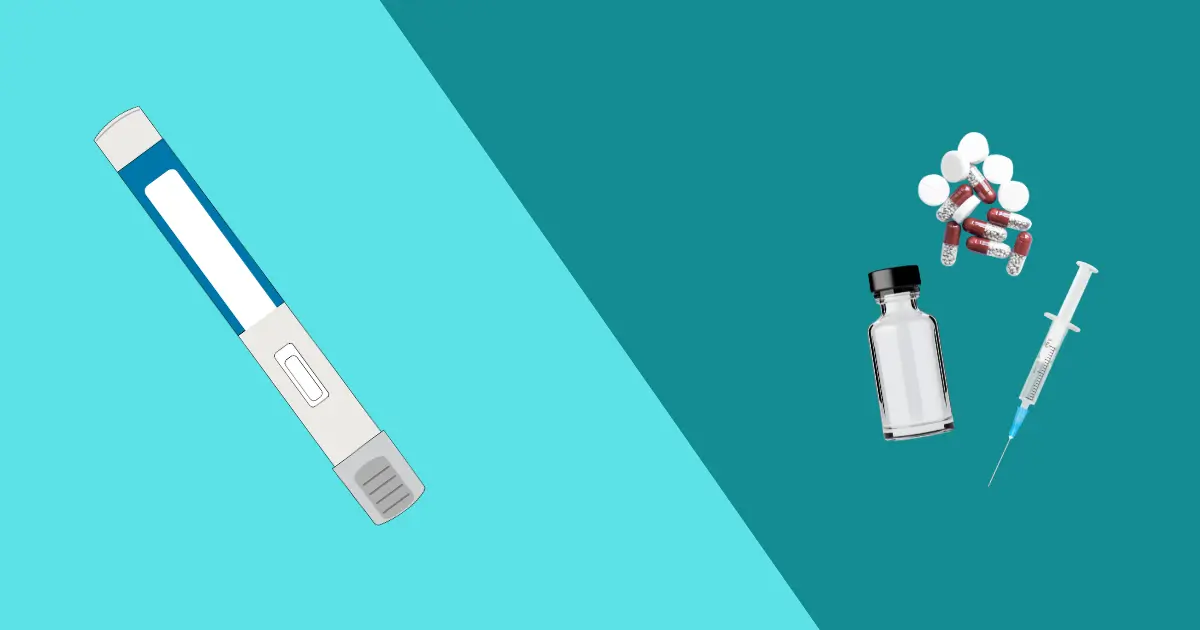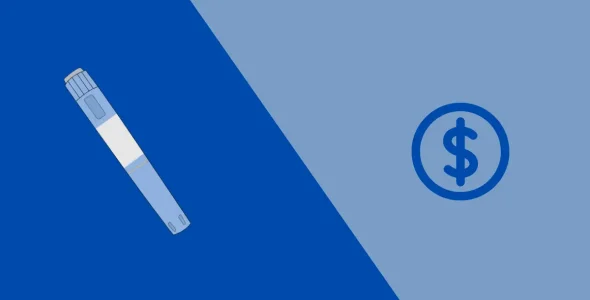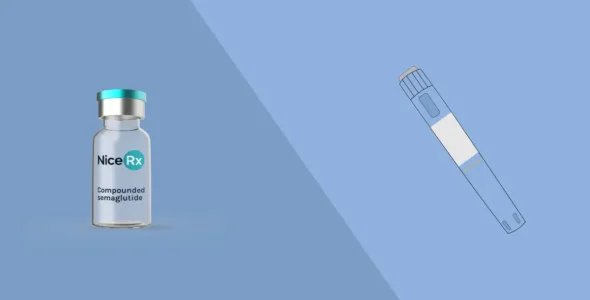Semaglutide alternatives: Your guide to other effective weight loss medications
If you're considering weight loss medication, you've likely heard of semaglutide (the active ingredient in Ozempic and Wegovy). But what if it's not the right fit for you?
Key highlights
- Although semaglutide is an effective medication, some patients consider its alternatives due to cost and insurance issues, persistent shortages, intolerable side effects, insufficient results, certain health conditions, or a preference for pills.
- Prescription alternatives to semaglutide include tirzepatide, liraglutide, bupropion/naltrexone (Contrave), phentermine/topiramate (Qsymia), orlistat, oral semaglutide (Rybelsus), dulaglutide, and exenatide.
- Emerging next-generation options are Cagrisema, Retatrutide, and pipeline or investigational drugs such as VK2535, Amylin analogues, and mazdutide. They are currently in clinical trials and not approved by the FDA for weight loss.
- Natural alternatives and lifestyle changes include berberine, cinnamon, ginger, turmeric, a high-protein diet, dietary fiber, water preloading, adequate sleep, and stress reduction. Remember, these alternatives do not have the same pharmaceutical efficacy as prescription medications.
- The choice of a suitable alternative depends on your weight loss goals, health condition, affordability, insurance coverage, your body's tolerance, and route preferences.
Semaglutide (Ozempic, Wegovy, and Rybelsus) is a popular GLP-1 agonist that has gained popularity due to its effectiveness in promoting weight loss and managing type 2 diabetes. However, its high cost, insurance barriers, and ongoing national shortages are challenging for many patients, which makes alternatives an important consideration.
Some patients experience intolerable side effects or simply do not get the desired results. In these cases, healthcare providers may recommend switching to another GLP-1 alternative or prescription weight loss pill. The available alternative options are categorized into three groups: New generation GLP-1s, classic prescription pills, and natural/lifestyle interventions. The choice of “best” alternative depends entirely on your individual needs, such as preference for a pill, need for the highest efficacy, or budget constraints.
This article will explore the leading semaglutide alternatives, such as GLP-1 medications, classic prescription oral medications, and natural supplements. It will guide you through safe, evidence-based alternatives to semaglutide, and help you compare pros and cons, understand access issues, and decide what might be best for you.
What is semaglutide and how does it work?
Semaglutide is a GLP-1 receptor agonist that has 94% structural similarity to the naturally occurring human glucagon-like peptide-1 hormone. GLP-1 is responsible for the regulation of blood sugar levels and appetite. It is secreted after food intake to promote satiety and maintain glucose levels. The medication occupies GLP-1 receptors to work in the following ways:
- Semaglutide acts on the hunger control center (lateral hypothalamus) of the brain to promote a feeling of fullness, which suppresses an urge to eat and reduces the intensity of hunger cravings.
- The medication acts on the beta cells of the pancreas to promote insulin release, which lowers blood sugar levels. Additionally, it inhibits glucagon secretion from the alpha cells of the pancreas to reduce glucose production.
- It slows gastric emptying and digestion by relaxing stomach muscles. Delayed digestion reduces hunger pangs and promotes satiety.
- The medication enhances insulin sensitivity to promote glucose reuptake in the cells, which helps regulate blood glucose levels.
Semaglutide is an FDA-approved medication with three available brand names: Ozempic, Wegovy, and Rybelsus.
Ozempic is FDA-approved for managing type 2 diabetes, lowering the risk of cardiovascular diseases, and preventing end-stage renal disease in patients with chronic kidney disease. The medication is used off-label for weight management.
Wegovy is indicated for lowering body weight in obese and overweight patients with at least one weight-related disease and treating metabolic dysfunction-associated steatohepatitis (MASH) in patients with mild to moderate liver fibrosis.
Rybelsus is an oral medication used for managing type 2 diabetes.
Semaglutide is used for both weight management and type 2 diabetes, depending on the dose. The medication is generally used in higher doses to promote weight loss. Some patients seek its alternatives due to affordability issues, side effects, insufficient results, and the shortage of the medication.
Why consider a semaglutide alternative?
Although semaglutide is an effective medication for weight loss and type 2 diabetes management, it is not suitable for everyone. Some patients consider semaglutide alternatives due to medical, financial, and personal reasons.
Cost and insurance coverage
Semaglutide is an expensive medication if your insurance plan does not cover it. Most insurance plans cover semaglutide for type 2 diabetes or cardiovascular risk reduction, and do not cover it when the medication is used solely for weight loss. A higher out-of-pocket cost is a major reason to seek alternatives to semaglutide. The following are the list prices and retail prices of Ozempic and Wegovy:
Semaglutide retail prices
| Pharmacy | Ozempic | Wegovy |
|---|---|---|
| Walgreens | $995 | $1,390 |
| Walmart | $995 | $1,447 |
| CVS Pharmacy | $995 | $1,390 |
| Costco | $964.99 | $1425 |
Drug shortages
Due to increasing demand, Ozempic and Wegovy were unavailable from 2022 to 2025. Drug supply issues can disrupt treatment. In such cases, semaglutide alternatives can help with weight loss and diabetes management.
Side effects
Semaglutide can cause gastrointestinal side effects such as nausea, vomiting, bloating, abdominal discomfort, constipation, or diarrhea, which may be too severe or intolerable. If you experience intolerable side effects, you can consider switching to an alternative medication.
Insufficient results
Although semaglutide is an effective medication, its results vary among individuals depending on their initial body weight, genetics, metabolism, and comorbid health conditions. It may not show expected results in some patients. If you do not experience the desired results, or you have hit a weight loss plateau despite using the maximum dosage, your doctor may consider switching to another medication.
Contraindications or health conditions
Semaglutide is contraindicated in certain conditions, such as personal or family history of medullary thyroid cancer (MTC) or multiple endocrine neoplasia type 2 (MEN 2 syndrome), those with a history of allergic reaction to semaglutide, pancreatitis, or gallbladder issues. You can choose safer alternatives for those with these conditions.
Preference for pills vs. Injections or wanting a different mechanism
Semaglutide is used in its injectable form (once weekly injections) for weight loss. If you do not prefer injections, you can choose daily oral alternative medications, such as Rybelsus. Additionally, some patients prefer daily injections over weekly injections or medications with different mechanisms of action. In such cases, alternatives to semaglutide are also helpful.
Prescription alternatives to semaglutide
The most effective alternatives are typically other prescription medications. They work in different ways to control appetite and promote satiety.
1. Tirzepatide (Mounjaro, Zepbound)
Tirzepatide is a dual agonist at GLP-1 and GIP receptors. It is available as two brand-name medications, Mounjaro and Zepbound. Mounjaro is FDA-approved for promoting glycemic control in patients with type 2 diabetes, while Zepbound is indicated for chronic weight management in obese and overweight patients and those with moderate to severe obstructive sleep apnea (OSA). The medication shows greater weight-loss benefits and glycemic control in clinical trials as compared to semaglutide.
Tirzepatide acts on GIP and GLP-1 receptors simultaneously (twincretin effect) to suppress appetite, enhance insulin release and sensitivity, and delay digestion to control blood sugar levels and reduce calorie intake. Low-calorie intake promotes weight reduction when used alongside a healthy lifestyle.
Clinical trial data show that tirzepatide promotes greater weight loss than semaglutide. In a phase 3 clinical trial, tirzepatide reduced 14.9% of body weight with a 5 mg dose, 19.5% with a 10 mg dose, and 20.9% with a 15 mg dose of tirzepatide.
Similarly, tirzepatide promotes a greater reduction in glycated hemoglobin levels as compared to semaglutide. A clinical trial evaluated the effectiveness of tirzepatide (Mounjaro) and semaglutide (Ozempic) in lowering glycated hemoglobin levels. Tirzepatide led to HbA1c reductions of –2.01%, –2.24%, and –2.30% with the 5 mg, 10 mg, and 15 mg doses. In comparison, 1 mg of semaglutide lowered HbA1c by –1.86% over a 48-week period. Overall, the findings suggest that tirzepatide leads to a more substantial decrease in HbA1c than semaglutide and can be a more effective alternative to semaglutide.
Typically, semaglutide is less expensive than Zepbound. Wegovy is available through NovoCare Pharmacy for $349 per month without insurance, whereas Zepbound costs $499 through LillyDirect.
Novo Nordisk offers a Wegovy Savings offer, allowing some patients with commercial insurance to pay as little as $0, depending on out-of-pocket costs. Similarly, if you have commercial insurance, you may get Zepbound for $25 for a 1- or 3-month supply. Without insurance, you may need to pay around $499 per month. Most insurance plans do not cover weight-loss medications, so it’s important to verify coverage with your provider.
The side effects profile of both medications is similar. However, you may experience slightly greater side effects with tirzepatide due to its dual action.
2. Liraglutide (Victoza, Saxenda)
Liraglutide is also a GLP-1 receptor agonist medication often used for weight loss or diabetes. Saxenda is FDA-approved for promoting weight loss, and Victoza is indicated for glycemic control in patients with type 2 diabetes. Liraglutide is available as daily injections.
As liraglutide is a GLP-1 agonist, it works in the same way as semaglutide to promote weight loss and glycemic control. However, this medication requires a daily injection compared to weekly injections with semaglutide.
In clinical trials, liraglutide 1.8 mg and 3 mg daily led to a mean reduction of 4.7% and 6% of body weight, respectively, after 56 weeks, compared to 2% with the placebo group.
A SUSTAIN 10 trial evaluated 577 adults with type 2 diabetes to compare how semaglutide (1 mg weekly) and liraglutide (1.2 mg daily) affected blood sugar and body weight over 30 weeks. Semaglutide users experienced a 1.7% drop in HbA1c, while the liraglutide group showed a 1.0% reduction.
Average body weight (baseline 96.9 kg) decreased by 5.8 kg with semaglutide and 1.9 kg with liraglutide. These findings indicate that semaglutide (Ozempic) provides greater improvements in both HbA1c and weight compared to liraglutide. However, liraglutide can be an alternative to semaglutide for those who require less significant weight loss or blood sugar control.
Liraglutide can be a good alternative when semaglutide is unavailable or intolerable. However, it is suitable for those who prefer daily injection. Daily dosing frequency can be a problem for some (less frequent than weekly) or a con for others. Both medications have similar side effects.
3. Bupropion/Naltrexone (Contrave)
Contrave is a combination of naltrexone and bupropion that combines an opioid receptor antagonist and an antidepressant to target the pleasure-reward centers of the brain to reduce hunger cravings and emotional eating. Bupropion increases dopamine and norepinephrine to control emotional eating and reduce hunger. Naltrexone blocks opioid receptors that limit reward sensation after excessive food intake. This combination is effective for patients who struggle with compulsive snacking and emotional overeating.
In clinical studies, Contrave reduced approximately 8% of their body weight after 56 weeks. Additionally, patients who used this medication along with strict dietary restrictions lost 11% of their body weight.
This medication comes in the form of pills, which are suitable for those patients who want to avoid injections. Additionally, Contrave treats emotional overeating, which GLP-1 medications do not target specifically.
The potential side effects of Contrave are nausea, headache, insomnia, dizziness, and increased blood pressure. The medication is contraindicated for patients with seizure disorders, chronic opioid users, and uncontrolled hypertension.
The medication is effective for patients who struggle specifically with emotional eating and intense cravings.
4. Phentermine/Topiramate (Qsymia)
Qsymia is a combination of phentermine and topiramate. Phentermine is an FDA-approved medication for weight management, while topiramate is used off-label for weight loss.
Phentermine is a powerful appetite suppressant that stimulates the production of epinephrine and norepinephrine. It helps reduce hunger cravings and promote satiety. Topiramate also modulates neurotransmitter release to reduce appetite, satiety signals, and cravings. The combination of both medications modifies your body’s physiology to reduce food intake.
A clinical study assessed the effectiveness of Qsymia for weight reduction. Patients taking Qsymia experienced 8–10% body weight loss over 56 weeks (about 13 months). Approximately 70% of participants lost at least 5% of their starting weight on the highest dose. In comparison, semaglutide (Ozempic) showed 10-15% weight reduction after 68 weeks. These results demonstrate that semaglutide has greater efficacy in weight management, but Qsymia can be an alternative to semaglutide. However, Qsymia is generally more cost-effective.
Qsymia is an effective oral medication. It is suitable for those who prefer oral pills over injectables. Side effects of Qsymia are tingling sensations, taste changes, dry mouth, and constipation.
Qsymia can cause potential harm to a fetus during pregnancy. This medication may be teratogenic and can cause birth defects. You should use contraception if you are of childbearing age.
5. Orlistat (Xenical, Alli)
Orlistat is available as a prescription version, Xenical, and an over-the-counter version, Alli.
This medication works locally in the digestive system to regulate appetite and prevent fat absorption. It inhibits pancreatic and gastric lipases that are responsible for fat breakdown. When these enzymes are blocked, fats can not be absorbed into or secreted through the stools.
A clinical study evaluated the effectiveness of orlistat in obese Chinese subjects. Patients reduced 3-5% of their body weight after using it for 6 months. Orlistat also improved cardiovascular risk markers such as LDL, cholesterol, and blood pressure, and increased insulin sensitivity.
Orlistat is widely available as an over-the-counter medication. Unlike semaglutide, no prescription is required to purchase Alli (orlistat).
Side effects of orlistat include gastrointestinal issues such as oily stools, diarrhea, urgency, flatulence, and gas after consuming a high-fat diet.
6. Semaglutide (Rybelsus)
Rybelsus is an oral formulation of semaglutide, which has the same active ingredient as Wegovy and Ozempic, but in the form of pills. Rybelsus is mainly approved for managing blood glucose levels in patients with type 2 diabetes, but is sometimes considered an alternative for weight loss (off-label).
It works by activating GLP-1 receptors to suppress appetite, increase insulin secretion, enhance insulin sensitivity, and delay gastric emptying. These actions reduce hunger cravings and calorie intake, which helps promote weight loss and glycemic control.
In the PIONEER 1 trial, adults with type 2 diabetes taking Rybelsus 14 mg daily lost about 2.3 kg over 26 weeks. The efficacy of Rybelsus with standard doses of Rybelsus is lower than injectable GLP-1 medications. However, the medication is under research for weight loss at higher doses than the standard doses. In the OASIS 1 clinical trial, adults with overweight (BMI 27 or greater) or obesity (BMI 30 or greater) without type 2 diabetes received Rybelsus 50 mg daily for 68 weeks, along with diet and exercise. Participants taking Rybelsus lost an average of 15.1% of their body weight, compared with 2.4% with the placebo.
Rybelsus is ideal for patients with needle phobia or those who want to manage diabetes with oral GLP-1 medications.
7. Dulaglutide (Trulicity)
Dulaglitide is a once-weekly GLP-1 agonist that is FDA-approved for promoting glycemic control in patients with type 2 diabetes. The medication is sometimes used off-label for weight management. However, it is less effective than other GLP-1 medications for weight loss.
As dulaglutide is also a GLP-1 receptor agonist, it works in the same way as semaglutide to promote blood sugar control and reduce body weight.
In a real-world observational study of over 2,000 type 2 diabetes patients, dulaglutide showed a mean body-weight reduction of ~2.9 kg. The medication lowered glycated hemoglobin levels by 1.0% after 30 months.
In a retrospective study, the addition of dulaglutide to diabetes medications, metformin or metformin and insulin secretagogues, led to 2.0% weight reduction after 6 months, and this benefit was sustained at 18 months.
Dulaglutide is an effective medication for diabetes management and reducing the risk of blood vessel-related and heart diseases. The medication is not FDA-approved for weight loss. It has the same side effects profile as semaglutide. Dulaglutide is not recommended for patients with a personal or family history of medullary thyroid carcinoma (MTC) and multiple endocrine neoplasia type 2 syndrome (MEN 2).
8. Exenatide (Bydureon BCise)
Exenatide is derived from exendin-4. This medication is an extended-release GLP-1 agonist. This medication may be used when patients cannot tolerate newer GLP-1 drugs.
Exenatide slows gastric emptying, reduces appetite, and improves glucose control by enhancing glucose-dependent insulin secretion. The extended-release formulation (BCise) provides stable weekly levels, which reduces the severity of nausea.
In this randomized trial, once-weekly exenatide (2 mg) led to a weight loss of more than 4 kg after 52 weeks.
Although exenatide is an effective medication, it is less effective than newer GLP-1 medications like semaglutide, tirzepatide, liraglutide, and dulaglutide. Additionally, injection site reactions are also more common with the microsphere formulation. Exenatide is not approved for weight loss, and its devices are less user-friendly than newer GLP-1 injections.
| Medication (Brand) | Administration | Average Weight Loss | Common Side Effects | List Price |
|---|---|---|---|---|
| Tirzepatide (Mounjaro, Zepbound) | Weekly injection | 15–21% of body weight. depending on dose | Nausea, vomiting, diarrhea, constipation, abdominal discomfort, slightly stronger GI effects than semaglutide | Zepbound: $399 (2.5 mg), $549 (5 mg), list price $1086 per fill; Mounjaro: $1,079.77 per fill |
| Liraglutide (Victoza, Saxenda) | Daily injection | 4.7% (1.8 mg) to 6% (3 mg) of body weight | Nausea, vomiting, diarrhea, connstipation, abdominal discomfort | Saxenda list price ≈ $1,349/month (similar to Wegovy), Victoza =$543.51 (for 28-day supply) |
| Bupropion/Naltrexone (Contrave) | Oral pills (daily) | ~8% (up to 11% with diet program) of body weight | Nausea, headache, insomnia, dizziness, high blood pressure | Approximately $747.39 per month |
| Phentermine/Topiramate (Qsymia) | Oral pills (daily) | 8–10% of body weight | Tingling, taste changes, dry mouth, constipation | ~$275 (30-day supply) |
| Orlistat (Xenical, Alli) | Oral pills (with meals) | 3–5% of body weight | Oily stools, diarrhea, gas, urgency (worse with high-fat diet) | Xenical: ~$140/month; Alli (OTC): ~$60/month |
| Semaglutide (Rybelsus) | Oral pill (daily) | 2–3% of body weight at standard doses and 15.1% at high-dose 50 mg (research only) | Nausea, vomiting, diarrhea, decreased appetite | $997.58 (30 tablets) |
| Dulaglutide (Trulicity) | Weekly injection | ~2–3 kg (≈2–3% of body weight) | Nausea, vomiting, diarrhea, constipation, similar GLP-1 side effects | ~$987.19 per month (varies by dose) |
| Exenatide (Bydureon BCise) | Weekly injection | ~4 kg after 52 weeks | Nausea, injection-site nodules, GI upset | $978.82 per month |
Emerging next-generation options
Several next-generation therapies are currently under clinical trials for weight loss. Although they show promising results in weight management, they are currently not approved by the FDA. These include Cagrisema, retatrutide, VK2735, Amylin analogues, BI 456906, and Mazdutide.
CagriSema
CagriSema combines an Amylin analogue, cagrilintide, with semaglutide. Amylin analogues mimic the hormone amylin, which promotes satiety, regulates appetite, and slows gastric emptying. This combination offers dual appetite regulation with semaglutide and cagrilinitide.
In a multicentre Phase 2 trial, patients who were administered cagrilintide 2.4 mg with semaglutide 2.4 mg lost approximately 15–16% of their body weight at 32 weeks, which is significantly greater than semaglutide alone. However, the medication has not yet been approved by the FDA.
Retatrutide
Retatrutide is a triple agonist at GLP-1, GIP, and glucagon receptors that occupies all of these receptors simultaneously to suppress appetite, enhance insulin secretion and sensitivity, increase energy expenditure, and promote fat metabolism.
In a phase 2 trial of 338 adults with obesity, retatrutide given once weekly caused dose-dependent weight loss over 48 weeks. Participants lost 8.7% (1 mg), 17.1% (4 mg), 22.8% (8 mg), and 24.2% (12 mg) of body weight, compared with 2.1% with placebo. At 48 weeks, a majority of participants on higher doses lost ≥15% of their body weight.
The most common side effects were mild-to-moderate gastrointestinal symptoms, which were dose-related and partially reduced with lower starting doses.
VK2735
VK2535 is a novel GLP-1 and GIP dual agonist (similar to tirzepatide). It is also in development as an oral pill, which can be an alternative to semaglutide.
In the Phase 1 multiple-ascending dose (MAD) study, VK2735 achieved up to 8.2% mean weight loss at day 28 for the highest dose (100 mg). At day 57 (4 weeks after the last dose), weight loss reached up to 8.3% from baseline, indicating the effect persisted after treatment ended.
Amylin Analogues ( AM833 / Cagrilintide as a standalone)
Amylin analogues such as AM833 / Cagrilintide are being studied both alone and in combination with GLP-1 medications. These medications show modest weight loss. Their FDA approval is still in process.
BI 456906 (Amylin + GLP-1 dual agonist)
BI 456906 is an investigational anti-obesity medication that acts as a dual agonist. The medication targets the glucagon-like peptide-1 receptor (GLP-1R) to help reduce appetite, slow gastric emptying, and improve insulin secretion. It acts on the glucagon receptor (GCGR) to increase energy expenditure and promote weight loss.
This combination not only suppresses appetite but also promotes calorie burning, which makes it a multi-pathway approach to weight management. In a 16-week Phase 1 trial of 36 Japanese men with overweight or obesity, BI 456906 reduced 5.6% to 12.4% of body weight compared to 1.1% with placebo. However, the results were dose-dependent. Weight loss was greatest in the 4.8 mg once weekly group (−12.37%).
The medication also delayed gastric emptying and reduced plasma alanine and glucagon release. Most common side effects were decreased appetite and mild GI events.
Mazdutide
Mazdutide is a dual agonist at GLP-1 mad glucagon receptors. The medication has been approved for weight management and glycemic control in China. It is currently under clinical trials for FDA approval.
In the Phase 3 GLORY-1 trial, 610 Chinese adults with overweight or obesity received Mazdutide 4 mg, 6 mg, or placebo weekly for 48 weeks. Mazdutide led to mean weight reductions of −12.1% (4 mg) and −14.8% (6 mg) of body weight at week 48, compared with −0.5% in the placebo. At week 48, 37% of participants on 4 mg and 50.6% on 6 mg achieved greater than 15% weight loss, compared to 2.1% with placebo.
The treatment was well-tolerated and demonstrated significant improvements in weight and obesity-related metabolic health.
Natural and lifestyle alternatives
Natural alternatives are generally less effective than prescription options, but they may have supportive benefits that aid in weight loss. If you have uncontrolled diabetes or cardiovascular diseases associated with obesity, you should use prescription medications under the supervision of a licensed healthcare provider instead of natural alternatives for optimal blood sugar control and weight loss.
Natural supplements do not match the efficacy of GLP-1 agonists. They can offer complementary support or initial steps for those who do not qualify for medication. For example, if your body mass index is in the upper normal range, you can try natural alternatives to prevent obesity and overweight. Always discuss with your healthcare provider before using supplements to determine whether they are safe for you.
Berberine (“Nature’s Ozempic”)
Berberine is also known as Nature’s Ozempic for its weight-loss benefits. Berberine is a bioactive compound that is derived from plants in the Berberis species. It improves insulin sensitivity, reduces glucose production in the liver, and promotes metabolic health. Clinical studies demonstrate that berberine helps treat metabolic syndrome and its complications, increases insulin sensitivity, reduces waist circumference, and lowers cholesterol and triglyceride levels in the blood.
Although it is popular on social media, its efficacy for weight loss is limited. It cannot be used as a replacement for prescription GLP-1 medications. Its consumption requires medical consultation due to potential drug interactions, such as metformin and anticoagulants.
Cinnamon, turmeric, ginger
Cinnamon, ginger, and turmeric contain bioactive compounds that have natural anti-inflammatory properties.
Cinnamon has chromium and polyphenols that improve insulin sensitivity and lower blood levels. Turmeric improves metabolic health and reduces body mass index, waist circumference, and triglyceride levels in the blood. Ginger reduces appetite, increases energy expenditure after meals, enhances heat production, and promotes fat tissue browning to prevent obesity and overweight.
High-protein diet
A high-protein diet naturally stimulates the release of GLP-1 hormones, which make you feel fuller earlier and for longer. Proteins also increase thermogenesis, which burns more calories during digestion and promotes weight reduction. Additionally, proteins help preserve muscle mass, lose fat mass, and increase metabolic rate during weight loss.
Aim for at least 60–90 grams of high-quality protein daily to get these benefits.
Fiber and water pre-loading
Dietary fibers slow digestion, stabilize blood sugar levels, and improve gut health. As they stay in the gut for a longer time, dietary fibers promote a feeling of fullness and suppress appetite, which aids in weight loss.
Water preloading (drinking water before meals) also sends signals of fullness to your brain and reduces hunger cravings. This early fullness decreases overall calorie intake. A clinical study involved middle-aged and older adults on a low-calorie diet. Individuals who consumed 500 mL of water before each meal achieved 2 kg more (or 44% greater) weight loss over 12 weeks than dieting alone.
Sleep and stress reduction
Poor sleep and stress raise ghrelin (also called the hunger hormone) and lower leptin (also known as the fullness hormone). This imbalance increases appetite and hunger cravings, leading to overeating and weight gain.
Follow these tips to manage your body weight naturally:
- Sleep for at least 7–9 hours of sleep per night to help regulate your hunger hormones.
- Practice stress-management techniques (like yoga, mindfulness, meditation, or breathing exercises) to lower stress levels and reverse ghrelin and leptin imbalance.
- Maintain a consistent sleep schedule to support hormonal balance and prevent chronic disruptions.
How to choose the right alternative for you
Before choosing the right alternative, discuss these factors with your healthcare provider:
- Your weight loss goals: How much weight do you want or need to lose?
- Budget and insurance: What can you afford? What does your plan cover?
- Route preferences: Which route of administration do you prefer? Do you prefer pills or injections? Which dosing frequency is suitable for you (daily vs. weekly)?
- Contraindications and health history: Do you have any conditions that make one drug safer than another?
- Tolerance for side effects: What side effects are you willing to manage?
The decision of choosing the best alternative must be made in partnership with a qualified healthcare professional who knows your full medical history.
Safety precautions
If you plan to use compounded GLP-1 medications like compounded semaglutide, purchase the medication from a licensed and reputable compounding pharmacy or FDA-registered outsourcing facility to make sure you receive legitimate products.
As compounded medications are prepared in compounding pharmacies, the FDA (U.S. Food and Drug Administration) does not regulate or review their quality. Compounded medications may have a risk of contamination. They may contain substandard or counterfeit products. Additionally, the FDA warns that compounded medications may have too much, too little, or no active ingredient at all.
The following are red flags that indicate compounded medication is not legitimate:
- The pharmacy does not require a valid prescription from the doctor
- Products do not have any labels
- The medication is labeled as “for research purposes only” or “not for human use.”
- The pharmacy is not licensed
- Medications have unrealistically low prices
- The pharmacy does not disclose the API (active pharmaceutical ingredient) supplier, testing standards, or certificate of analysis.
- Medications have claims for weight loss
- The medication promises no side effects after consumption
Additionally, do not combine multiple weight-loss drugs without consulting your doctor, as they may cause serious side effects.
Frequently asked questions
What is the most effective alternative to semaglutide?
Currently, tirzepatide (Zepbound and Mounjaro) has shown superior weight loss to semaglutide in head-to-head clinical trials, and it can be the most effective alternative to semaglutide.
Is tirzepatide better than semaglutide?
According to head-to-head clinical trial data, tirzepatide is better than semaglutide, as the medication has shown greater weight loss benefits. However, tolerability to side effects, cost, and individual response vary. Some individuals may experience greater side effects with tirzepatide due to its dual action.
Can I use Rybelsus (oral) instead of injectable semaglutide?
You can use Rybelsus instead of injectable medication, but oral absorption is less efficient and less effective as dosing constraints reduce its weight-loss potency. Rybelsus is not FDA-approved for weight loss. Healthcare providers may prescribe it off-label for patients who cannot administer injectable medications or have a needle phobia.
Is there an oral alternative as effective as the weekly injections?
Rybelsus (semaglutide) is a convenient alternative to weekly injections, but the medication does not have the same efficacy as injectable medications (Wegovy). Injectables generally lead to greater weight loss at standard doses. However, new higher-dose oral formulations (50 mg) are showing comparable efficacy to Wegovy.
Are there any over-the-counter (OTC) alternatives to Ozempic?
Orlistat (Alli), Qsymia, Contrave, and natural supplements like Berberine are over-the-counter alternatives to Ozempic, but they do not have the same efficacy as Ozempic. These medications are not pharmacologically equivalent to injectable semaglutide.
Are natural supplements a safe alternative?
Yes, berberine, cinnamon, ginger, and turmeric are natural and considered safe alternatives to semaglutide that show modest metabolic effects. However, they do not match the efficacy of prescription medications. Always discuss possible interactions with your doctor before starting any supplement. If you have uncontrolled diabetes, obesity, or any health condition related to obesity, such as hypertension, cardiovascular diseases, or hypercholesterolemia, it is typically recommended to take prescription medications.
When should someone switch from semaglutide to an alternative?
You can consider switching from semaglutide to an alternative when the side effects of semaglutide are intolerable, you have cost or insurance issues, or you have hit a weight-loss plateau that persists even after using the maximum dose. Before switching the medication, consult your doctor and make any changes under a clinician’s guidance.
Do non-GLP weight-loss drugs still have a role?
Yes, non-GLP-1 appetite suppressants or metabolic agents may supplement GLP-1 therapy in some patients, but they tend to be less effective when used alone and have different risk profiles. You might not experience the same results as you do with standard GLP-1 medications.
What is the cheapest semaglutide alternative?
The choice of the cheapest semaglutide alternative varies, but older generics like phentermine alone or OTC options are typically cheapest. You can also check manufacturer savings cards for drugs like Zepbound that can significantly reduce medication costs. If eligible, you can get Zephound for as low as $25 for a 1-month, 2-month, or 3-month supply.
Can I get these alternatives online?
Yes, many reputable telehealth platforms prescribe these alternatives after an online consultation.
Conclusion: Finding the best semaglutide alternative for you
Although semaglutide is a powerful medication for weight loss, it is not the only one. If you cannot tolerate the side effects of semaglutide, or the medication is unavailable, or you have cost and insurance concerns, you can consider alternatives after consulting with your doctor. There is a wide range of effective alternatives, but the choice of the “best” alternative is highly personal.
The good news is that you can choose options that have similar efficacy to semaglutide or are more effective for weight management and glycemic control. The safe alternative options include tirzepatide (a dual agonist), Rybelsus (an oral pill), or classic appetite suppressants. Remember, natural alternatives are not pharmacologically equivalent to semaglutide, and they may not show the same effects. However, they can support weight loss to some extent.
Each individual’s journey is unique. Use this guide as a starting point for a productive conversation with your doctor to find the safe and effective weight loss path that is right for you. Consult a licensed provider (telehealth or in-person) to review your full medical history, insurance coverage, and lifestyle factors to choose the most effective and safest alternative.






